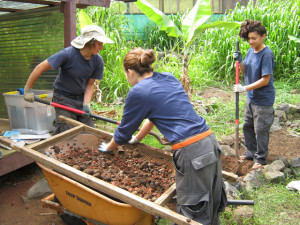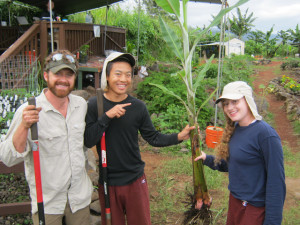By Travis Slagle, Horticulture Therapy Director
Imagine what the world would be like if wilderness therapists of the future became organic farmers. What if the people entrusted to witness life’s most significant transitions traded in the more esoteric theories of eco-psychology and wilderness survival for a simple shovel and pitch fork? For many people, the lure of getting away from your life to find yourself in the solace of the wilderness is a palpable force. Yet, the practice of wilderness therapy and the modern vision quest experience have become increasingly inaccessible to many of the estimated eight billion people living on Earth today, all of whom face diminishing resources and the intrinsic need to provide for themselves and their families. Here is the crossroads where organic farming, rites-of-passage, and wilderness therapy meet, raising the question; what if wilderness therapy guides were responsible for restoring the nature-centered rituals of planting, harvesting, and digging in the soil? Could this be the key to overcome the difficulty of transition and the inherent loneliness of a return from a wilderness experience?
As we all know, the purpose of going to the wilderness for a life changing experience has never been to stay there. In fact, the growing edge of wilderness therapy isn’t to delve deeper into social isolation, but instead to relearn the skills and collective wisdom of helping young people find a meaningful place in society. The future needs outdoor therapy guides to lead struggling teens from the mountaintops and deserts of the wilderness to the urban gardens, farmers markets, biodynamic farms, and permaculture communities that are thriving in cities, country-sides, and backyards all over the world. Growing the food you eat allows individuals to put into practice the work and struggle of applying new skills and insight into action. There is no better time to bring back the enduring and once sacred pursuit of nurturing the food that sustains our communities and heals the Earth, and in the process being reminded of the most fundamental qualities of humanity.
When we do this, the seeds that are planted in wilderness therapy will no longer be symbolic. Rather than observing nature from a distance, or battling through the backcountry, the time has come to lean into the sun each morning with a watering can, to kneel on the earth while pulling out weeds and thinning beets, to feel the life teeming beneath the surface as we sift through the soil to make space for new roots. The life of an organic farmer is a reminder of the importance of working with nature as opposed to conquering, traversing, or simply getting through it. A farmer’s work is a humble and thankless job that gives society the luxury of idle time. Yet, with all the comforts of modern living, younger generations are facing an exploding rate of anxiety, depression, and learning disorders. The farmer knows the work that’s needed to integrate the wisdom of nature through hard work and meditative action; leading society on a path that measures the gravity of our ideals with the heroic task of growing the food we eat and sharing abundance with a neighbor.
surface as we sift through the soil to make space for new roots. The life of an organic farmer is a reminder of the importance of working with nature as opposed to conquering, traversing, or simply getting through it. A farmer’s work is a humble and thankless job that gives society the luxury of idle time. Yet, with all the comforts of modern living, younger generations are facing an exploding rate of anxiety, depression, and learning disorders. The farmer knows the work that’s needed to integrate the wisdom of nature through hard work and meditative action; leading society on a path that measures the gravity of our ideals with the heroic task of growing the food we eat and sharing abundance with a neighbor.
The process of growing healthy food and building a more sustainable community was once the central activity of human civilization, and the foundation of a reciprocal relationship with nature that has sustained people on Earth for thousands of years. Going back in time, almost ten thousand years ago, nomadic people decided to put their energy towards cultivating the land versus traversing it, and in the process initiated the dawn of human civilization. The questions our ancient ancestors asked themselves thousands of years ago could be strikingly similar to the most pressing questions being asked today. Questions like, how can we spend more time with our family and less time hunting (the modern hunt being for a paycheck)? Are we tired of wandering around in the wilderness and feel the need for a lasting community? How will we ensure our children will have a better life than our own, and how can we live more sustainably with the glaring reality of increasing population and diminishing resources? These are the questions that have come full circle, leading to an important moment in human history, not just in terms of an individual’s mental health, but in health of our families, schools, and communities.
Like all indigenous ways of knowing, the role of the land and a person’s relationship to it provided a powerful lesson, revealing our interconnectedness through the complicated patchwork of natural systems that sustain all of life. Just as the nomad evolved into an agriculturalist, the questions that led to a new era of human experience have now returned to the forefront of modern society. Thus, wilderness therapists and farmers alike must recognize the need to answer these questions in a way that restores balance and integrity between people and their relationship with themselves and the mysteries of the Earth.
 In an information-age that has spun out into an era of crippling anxiety and distraction, what matters more than an isolated wilderness experience is an initiatory process with the potential to not only help struggling teens, but to transform society. Nurturing the food we eat offers the most basic life lesson and cornerstone of sustainability, teaching us that what we give directly impacts what we can take. What better way to humble ourselves and restore our communities than by working side by side planting food for future generations, and honoring the ongoing struggle of growth in a garden? Growing your own food is an activity that universally connects us to our most primal need and ancient practice of providing not just for ourselves but for the needs of others. With cities that are now exceeding twenty million people living within a few square miles, we are confronting the possibility that many of the changes we face are no longer a part of nature, but instead are manifested by a loss of relationship with it, and perhaps a desperate attempt to hold onto nature as it slips away. Herein lies a great moment of transition, requiring more than wilderness therapists and organic farmers doing their work in separate places where their paths often never meet. It’s time to let go of rugged individualism and renegade attitudes that no longer serve our community, and acknowledge that the nomadic lifestyle and fervor of wilderness survival is not the model for a sustainable future. Sustainable farming and organic gardening is a good reminder that learning from nature is not a one-way street; it requires giving back, a return to community with something to offer, integrating through action a sense of purpose and necessity within society. For wilderness therapy guides and organic gardeners willing to share the responsibility of caring for the next generation, and help usher the world into a more hopeful future, a primordial land dance awaits us!
In an information-age that has spun out into an era of crippling anxiety and distraction, what matters more than an isolated wilderness experience is an initiatory process with the potential to not only help struggling teens, but to transform society. Nurturing the food we eat offers the most basic life lesson and cornerstone of sustainability, teaching us that what we give directly impacts what we can take. What better way to humble ourselves and restore our communities than by working side by side planting food for future generations, and honoring the ongoing struggle of growth in a garden? Growing your own food is an activity that universally connects us to our most primal need and ancient practice of providing not just for ourselves but for the needs of others. With cities that are now exceeding twenty million people living within a few square miles, we are confronting the possibility that many of the changes we face are no longer a part of nature, but instead are manifested by a loss of relationship with it, and perhaps a desperate attempt to hold onto nature as it slips away. Herein lies a great moment of transition, requiring more than wilderness therapists and organic farmers doing their work in separate places where their paths often never meet. It’s time to let go of rugged individualism and renegade attitudes that no longer serve our community, and acknowledge that the nomadic lifestyle and fervor of wilderness survival is not the model for a sustainable future. Sustainable farming and organic gardening is a good reminder that learning from nature is not a one-way street; it requires giving back, a return to community with something to offer, integrating through action a sense of purpose and necessity within society. For wilderness therapy guides and organic gardeners willing to share the responsibility of caring for the next generation, and help usher the world into a more hopeful future, a primordial land dance awaits us!